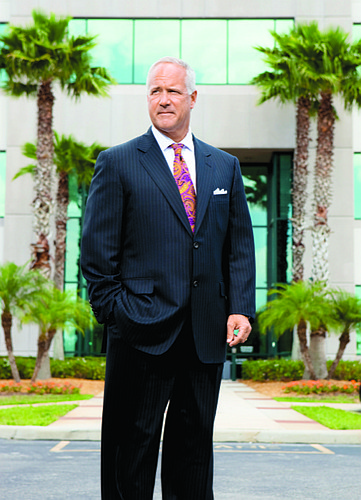- July 26, 2024
-
-
Loading

Loading

T. David Lewis has a passion for healthy living — you could say an obsession. In UnitedHealthcare of Florida's lobby, a road bike similar to the one he races is on display.
As he rattles off figures from the Centers for Disease Control with ease, this healthy preoccupation is easy to see. In fact, as the CEO of UnitedHealthcare in Tampa, a company that insures about 2.7 million members in Florida, health is something that is essential to his business.
To inspire the clients it insures to become more informed about their providers and take more control of their health, the firm has initiated new programs aimed at incentivizing good health.
The Edge program, which does just that, led to a record year for UnitedHealthcare in Florida. “January was the best month in terms of enrollment since I started,” Lewis boasts.
“It's the 80-20 rule,” Lewis says, “You have 80% of people paying for 20% of the sickest people.” This is a concern for him, for the sickest patients are the most costly for the insurance firm. But Lewis says other figures trouble him the most. According to the CDC, 50% of health care costs are avoidable. So instead letting poor decisions go unchecked, Lewis and UnitedHealthcare have developed incentive packages designed to reduce the bad behavior and enhance good behavior — thereby taking strain out of bulging waistlines and United's costs.
“It seems rather simple, doesn't it?” Lewis remarks with sarcasm. In fact, the data used to design the program offerings for United is complicated and minute. For example, for the Edge program, which gives incentives for consumers to visit well-rated doctors, relies on individual-instance data. For a surgeon, United gives a rating of zero, one, or two stars based on criteria used by the American Society of Orthopedic Surgeons. Consumers are incentivized to choose the higher rated surgeon.
“We're really lifting all the boats,” Lewis says of the rating program, which he says is well received by doctors looking to improve their rating. Seeing a higher-rated doctor is supposed to lead to improved health outcomes and decreased health expenditure — which comes back to lowering costs for United. Says Lewis: “We are definitely the innovator.”
Simply Engaged is another product that encourages healthy decisions. Lewis says the program offers cash to attend a smoking cessation class or do biometric testing. A consumer doesn't even have to perform well; however if he or she does, Lewis says the award increases.
In the tests that United has run on its own employees, 73% agreed to do an annual physical in 2010 compared with 39% in 2009. During the same time period there was a 500% increase in the completion of wellness coaching. Clearly, the tests show United's strategy is working.
“We think there is an incredible amount of low-hanging fruit out there'” Lewis says, “and if we pick it, we think we can convince customers they need to take care of themselves.”